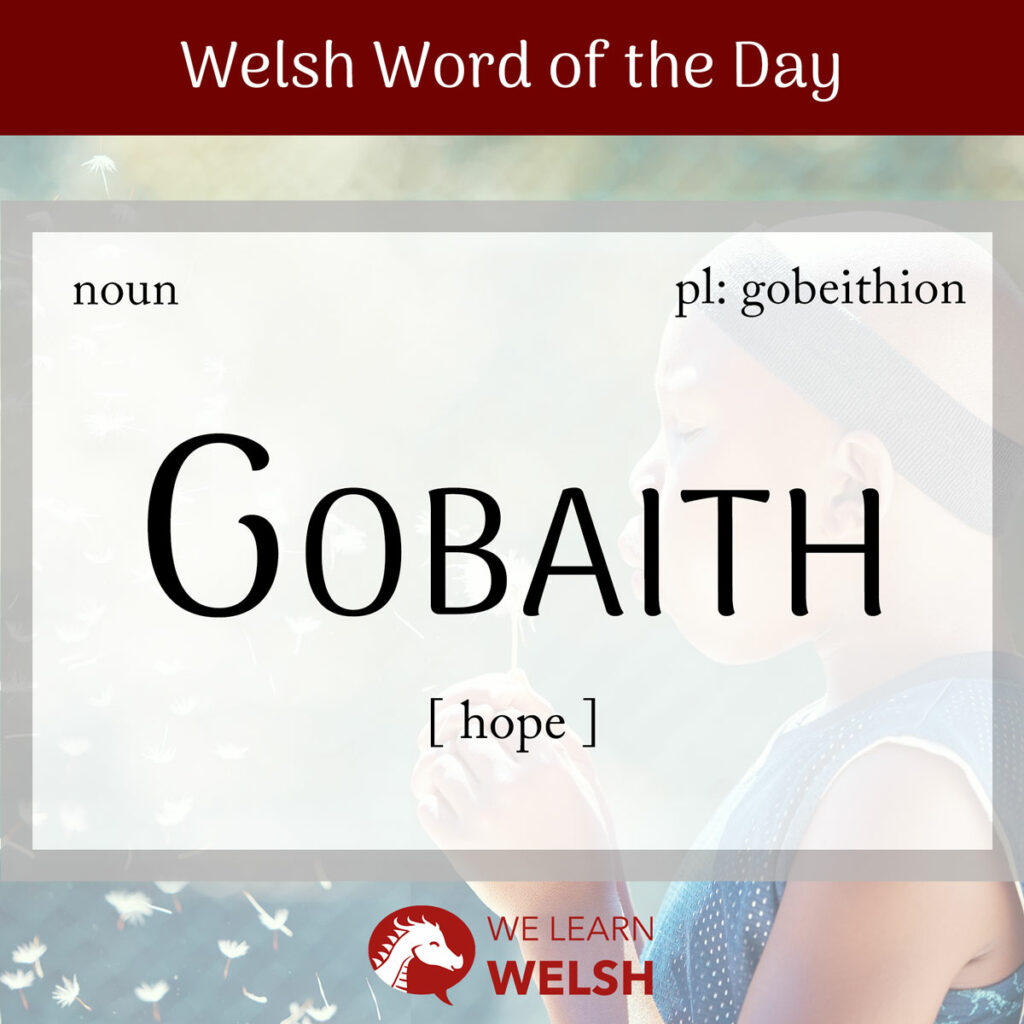We all have hopes and dreams for the future. Some of us may aspire to fame, while others are content with the idea of a simple life, surrounded by family, close friends, a home, and a fulfilling job. In Welsh, the word for hope is gobaith, which refers to the desire for something to happen or to be true, or a positive expectation for the future.
gobaith
Gobaith is susceptible to the soft and nasal, but not the aspirate, mutation. It is generally considered a masculine noun – though the GPC states it can be either masculine or feminine – and for this reason, it does not undergo a soft mutation after the definite article. The plural form is gobeithion or gobeithiau.
Soft mutation
obaith
Nasal mutation
ngobaith
Aspirate mutation
N/A
It comes from the Middle Welsh gobeith, and is attested in Old Welsh as the given name Guabeith or Guobeith.
Gobaith is, of course, the noun for hope, but in everyday conversation, you’ll more often encounter the verb-noun gobeithio (to hope). In North Wales, it’s quite common to hear the shortened, quicker form beithio, while in South Wales, you’ll often hear beitho. Note that you can drop dw i’n, wyt ti and so on and just use gobeithio on its own in informal Welsh.
If you want to say “I hope (that)…” in Welsh, the grammar changes depending on whether you are talking about a past, present or future event. Below are some simple examples that should give you an idea of the changes that occur.
Present
Dw i’n gobeithio (I hope) + wyt ti’n hapus (you are happy) = Dw i’n gobeithio bod ti’n hapus. / Dw i’n gobeithio dy fod ti’n hapus.
Dw i’n gobeithio (I hope) + John yw e / John ydy o (it is John) = Dw i’n gobeithio mai John yw e. / Dw i’n gobeithio mai John ydy o.
Imperfect
Dw i’n gobeithio (I hope) + roeddet ti’n hapus (you were happy) = Dw i’n gobeithio bod ti’n hapus. / Dw i’n gobeithio dy fod ti’n hapus.
Dw i’n gobeithio (I hope) + John oedd e / John oedd o (it was John) = Dw i’n gobeithio mai John oedd e. / Dw i’n gobeithio mai John oedd o.
Past
Dw i’n gobeithio (I hope) + gest ti hwyl (you had fun) = Dw i’n gobeithio bod ti wedi cael hwyl. / Dw i’n gobeithio dy fod ti wedi cael hwyl.
Future
Dw i’n gobeithio (I hope) + byddi di’n hapus (you will be happy) = Dw i’n gobeithio byddi di’n hapus. / Dw i’n gobeithio y byddi di’n hapus.
You may notice that the grammatical construction is the same for the present and imperfect tense. Because of this, Welsh speakers might include additional words or phrases to specify the tense.
(Dw i’n) gobeithio bod ti wedi cael penwythnos neis.
I hope you had a nice weekend.
IMPORTANT: In informal spoken Welsh, speakers don’t always stick rigidly to these rules. In fact, it’s quite common for people to follow dw i’n gobeithio / gwybod / meddwl… directly with the imperfect or past tense, without applying the expected bod construction.
The opposite of gobaith is diobaith, which is the combination of di (meaning “un” or “less”) and gobaith. It can be translated as hopeless or without hope. And we mustn’t forget about the derived adjectives gobeithiol (hopeful) and anobeithiol (hopeless)!
Dw i’n obeithiol fy mod i wedi pasio fy arholiadau.
I’m hopeful that I’ve passed my exams.
If you live without the hope of something happening, you can say heb obaith (without hope), while if you live with the hope of something happening, you can say byw mewn gobaith. Something you probably didn’t know is that the latter is also a possible response to the question Sut wyt ti? (How are you?).
Sut wyt ti? – Byw mewn gobaith!
How are you? – Living in hope!
At times, we are all plagued by the feeling that there is dim gobaith (no hope) no matter what we do to change our situation, but we should do everything in our power to avoid letting these teimladau negyddol (negative feelings) overwhelm us too often!
Interestingly, gobaith and the verb-noun form gobeithio appear in a plethora of Welsh idioms and sayings. Here are a few of our favourites!
- gobaith mul yn y Grand National = no chance whatsoever
- dim gobaith caneri = no chance whatsoever
- gobaith yw grym pob ymdrech = hope provides strength for every effort
- gwell teithio mewn gobaith na chyrraedd mewn anobaith = better to be an optimist than a pessimist, literally, better to travel in hope than arrive without it
- gobeithio i’r annwyl / gobeithio i’r nefoedd = to hope to goodness / the heavens
- gobeithio’r Tad! = to hope to the father / God
- gobeithio’r gorau = to hope for the best
- mae yna obaith = there is hope
- Urdd Gobaith Cymru = Wales’ largest youth organisation
Does gan Wrecsam ddim gobaith ennill!
Wrexham has no chance of winning!
If you think about it, everybody has hopes and dreams, whether that be hopes for the next day or for the next year. Why not practise talking about your hopes and dreams in Welsh with someone you know?


